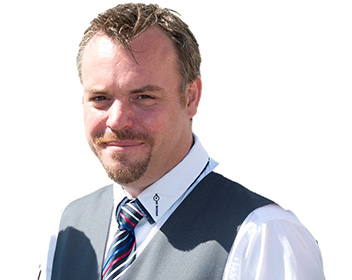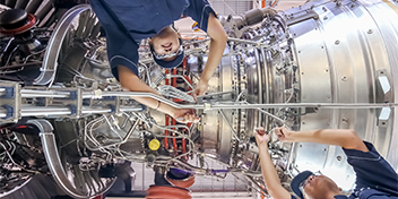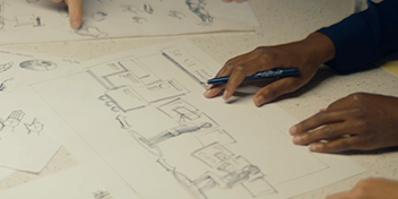What inspired you to become an engineer or pointed you towards an engineering career?
I have had a keen interest in engineering from an early age, I loved Lego as a child, and my favourite TV shows always involved some sort of engineering-based problem solving (think MacGyver, A-Team, those kind of shows). I’ve always been fascinated with the natural world, showing a keen interest in how things work, all of which inspired me to pursue a career in Engineering.
In terms of my career, my first introduction to engineering as a profession was working in nightclubs as a trainee lighting technician for a very short period whilst in six form college. I got this opportunity by chance and was a natural at programming and operating the lights, although I didn’t find this to be a particularly stable career path, and therefore I randomly applied for a role as an Apprentice Cable Jointer with a contractor working for London Electricity Services.
Through a combination of ambition and opportunity, I have since worked across a variety of roles, both operationally, and managerially, over a 26-year period, within the electrical distribution sector.
Please describe your role or position within your workplace.
I currently work for the UK’s largest independent utility asset management organisation, BUUK Infrastructure, which is part of the Brookfield Group of companies (Brookfield Infrastructure Partners). The business unit I work within is called Power On, which is the UK’s market leading Independent Connections Provider (ICP).
In my current role as Construction Director, I am both responsible and accountable for the safe construction, connection, and adoption of thousands of high-quality utility assets each year. This predominantly includes electrical distribution network connections, but we also connect water, fibre, heat, and gas. I have an excellent team of highly skilled engineers, managers, supervisors, and support assistants who each deliver exceptional customer service to some of the UK’s largest housing developers.
My role is very much strategic, and as part of the senior leadership team in Power On, we are consistently thinking of ways to continuously improve our service offerings, enhance our operational efficiencies, and ensure the safety and wellbeing of our teams, who can work in challenging conditions from time to time, improve the quality and compliance of the assets we deliver for all our key stakeholders, and make the customers experience as effortless as possible.
Can you describe a typical working day?
My job is quite varied, therefore it’s difficult to describe a typical day. One day I can be delivering strategic management sessions, another, solving complex connection issues with the team, developing, or delivering training sessions, safety leadership talks, or conducting safety management tours.
I consider myself to be relatively ‘hands on’ and I like to lead from the front, so I spend at least a few days a month going visiting our work sites and seeing our teams in action, meeting the workforce, and having positive interactions discussing topics such as safety and wellbeing.
I regularly liaise with Distribution Network Operator (DNO) business leaders, local authorities, service providers, suppliers, regulators, accreditors (such as LRQA, ENA etc) as well as our customers to ensure our service offerings meet or exceed expectations.
I am an Assessing Officer, Authorising Manager, Technical Advisor, and Business Lead on National Electricity Registration Scheme / Gas Industry Registration Scheme and Water Industry Registration Scheme, therefore some of my time is focused on assisting and advising my area management team on safety, quality and compliance processes and procedures, as well as aiding them with learning and development, coaching and mentoring.
In terms of financial management, I dedicate time to finding creative ways to improve business processes, control costs and increase productivity to ensure we meet / exceed our shareholders expectations and promote continued growth within the organisation. No two days are the same and each day I have worked for BUUK have been a positive and fulfilling experience.
Are there any particular challenges or unusual aspects to your role?
Utility infrastructure is a heavily regulated industry, with lots of very important rules and procedures. Ensuring our diverse workforce operate as safely as possible, whilst delivering quality assets on time and within budget can be a challenge at times. Therefore, this requires a high level of creative thinking to develop new and improved ways of ensuring our teams understand our values, vision, mission, and care for each other’s safety and wellbeing, as well as understanding the needs and requirements of our customers. To achieve this, we consistently promote a culture of trust and commitment rather than enforce a compliance driven culture and encourage a continuously improving mindset across all our teams.
As the UK accelerates toward net zero, we consistently work to ensure our teams consider our impact on the environment, whether during the design phase or through the construction lifecycle when building our networks. This can require the implementation of change programmes, some of which can cause conflict at times, presenting challenges adjusting to a new way of doing things. One area we are focused on at the moment is the transition from natural gas to electrified heat hubs, and this has involved extensive research and development and will require further changes to the way we operate both internally and for our customers over the next few years. This is a very exciting time and despite its challenges, it has been a great experience to be part of such an excellent, forward thinking team.
What do you find most enjoyable about your job?
The most enjoyable aspect of my job is helping others to reach their full potential. I have helped many young engineers over the years to grow into highly skilled members of the team, by encouraging them to pursue opportunities in higher education, develop professionally through institutions such as the Institution for Engineering and Technology (IET) and learn new skills to enhance their capabilities, enabling them to successfully deliver highly complex projects.
Literally, whilst typing this case study, one of my young engineers excitedly wrote to me to let me know they had successfully gained Engineering Technician (EngTech) status through the IET, following several coaching sessions, which is an awesome achievement.
Is there a great professional achievement or high-profile accomplishment that you would like to tell us about?
I have been fortunate throughout my career to be involved in a number of ground-breaking industry activities over the years. We were the first ICP in the UK to self-connect to an incumbent distribution network, and I helped develop the processes and procedures with the to enable this to happen. I also led the team that connected the first independently adopted Primary Substation in the area. All of this has helped extend contestability for independent connection providers across the country, offering greater flexibility for house builders and developers nationally.
We are currently focused on introducing flexibility into the distribution network, particularly where there is an influx of embedded generation or demand requirements such as electric vehicle charging, as well as working with DNO’s on nested network solutions where capacity restraints exist.
Over the years, I have helped introduce new systems into our organisation associated with business, quality and competency management and data analytics. I also continue to implement lean strategies across a wide variety of activities, ranging from procurement of materials to control of stock and service providers, which lowers costs and improves margins.
From a personal perspective, my greatest achievements have been associated with my own professional development. I was fortunate to have been sponsored academically by various organisations throughout my career and as a result spent several years studying for a degree in Power Distribution, followed by Electrical and Electronic Engineering at London South Bank University, and then went on to complete a Business Administration degree at master’s level with the Open University, all this whilst working full time, with a young family.
These achievements gave me the opportunity to help contribute to change within, and ultimately improve the utilities industry sector for our customers. They also contributed to my successful application for professional registration status as a Chartered Engineer through the IET and Engineering Council, an achievement of which I am immensely proud, and hope inspires others to follow a similar trajectory.
What contributed to your decision to become professionally registered?
Becoming professionally registered as a Chartered Engineer has been an important part of my continued professional development journey. Not only is professional registration globally recognised, signifying a high level of achievement in engineering, it also demonstrates that you have achieved the highest standards of engineering competence and expertise. Those that are aware of the process and requirements to becoming professionally registered will understand that as a Chartered Engineer, you will have demonstrated an ability to develop solutions to engineering problems through new or existing technologies, employing a mix of creativity, innovation and change, as well as having a high level of technical accountability for complex systems with a significant level of risk. In my view this is a very important milestone in an engineer’s career and should be something all engineers aspire towards.
In what ways has registration benefitted your career?
Becoming professionally registered complimented many years of hard work and study, I was able to use the knowledge and skills gained though my various academic achievements to piece my professional journey together and enable a successful application. It demonstrated a high level of commitment, focus, drive, ambition, and determination as well as a winning mindset, which has not only benefitted my own career, opening new pathways to different areas I may not have gained exposure to before, but also helped inspire others. I currently lead on the Institution of Engineering and Technology (IET) Corporate membership scheme within my organisation, with over 40 engineers at various stages of membership and professional registration.
How does your employer benefit from your professional registration?
BUUK Infrastructure benefits in several different ways. Professional registration assures that our staff are continuously developing on a professional level, that they are accredited for their competencies and capabilities in engineering disciplines and provides a level of confidence for our customers that we employ a highly skilled workforce. Registration also mandates that our teams operate to an internationally recognised code of conduct with a highly professional attitude.
Is there any advice you would pass on to someone considering professional registration?
I have run many sessions in the last few years promoting the importance of professional registration within my organisation. The advice that I always pass on is take your time to really understand the competencies required for your chosen level, whether that is EngTech, IEng or CEng, understand your limitations and work on gaining experience in the areas your require further development in, do your research, map out your evidence, and don’t be afraid to ask for help or guidance.
I have seen a lot of people jumping straight into CEng applications when they have only really complied enough evidence to meet EngTech level, and this can lead to disappointment if rejected and put people off from continuing their application. In most cases, all you need to do is ask for an opportunity to be part of a process, initiative, or project where the necessary experience can be gained. This is why recording your Continued Professional Development (CPD) and mapping out a minimum five-year CPD plan is important, as it helps provide a structured path to professional registration.
Where do you see yourself in your career in five years’ time or what are your future ambitions?
My focus has always been on growing my team and our organisation, and this also helps me grow as a leader. This strategy is incorporated within my currently five-year CPD plan which focuses on our industries transition to net zero, and all the associated systems, processes and procedures that will enable that to happen as smoothly as possible. Further developing and implementing our heat products, diversifying into different markets such as energy utilisation, as well as looking at areas of flexibility within the new connections market will play a vital part in helping make this happen.
We are currently transitioning industry wide from traditional distribution networks to distribution systems, where embedded generation and energy storage plays a huge role. We are also moving toward hydrogen heated homes, and leading on the technological changes associated with these transitions is fundamentally important to achieving net zero.
Outside work, is there any activity you enjoy doing in your spare time that relates to engineering? For example, do you participate in mentoring, volunteering, or membership of other engineering groups?
I enjoy several activities in my spare time, I am a registered STEM ambassador and have given talks to local schools and collages on the benefits of becoming an engineer, I have participated in career days, mock interviews and provided advice and guidance to school leavers. I recently participated in a podcast with the IET and a company called silver fox on my career journey and the benefit of pursuing a career in engineering, which you can listen to here.
I am also very musical, I have my own recording studio where I produce a variety of different types of electronic music, using Ableton Live, which I publish on my personal Soundcloud page, and create music video content in applications such as Adobe Premier Pro for my YouTube channel. This has enabled me to gain skills in sound engineering, mixing, and mastering, music production and video editing, which I find is a great way to unwind in my spare time.









